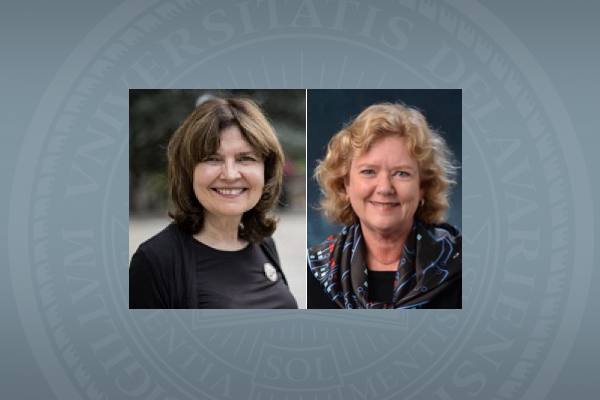School of Education
March speakers to discuss how children learn and compose with digital media

Spring colloquium series
The University of Delaware School of Education’s colloquium series continues in March with presentations by Sandra L. Calvert, professor of psychology and director of the Children’s Digital Media Center at Georgetown University, and Bridget Dalton, associate professor of literacy studies at the University of Colorado, Boulder.
On Monday, March 7, Calvert’s presentation, “Children’s Early STEM Learning: Lessons from Media Characters,” will discuss how children learn from their favorite media characters. Children often develop parasocial relationships or close one-way relationships with specific characters. Calvert will discuss how these parasocial relationships can improve children’s learning of science, technology, engineering, and mathematics (STEM) concepts with a focus on mathematics.
She will also consider implications for children’s learning from intelligent, personalized, interactive media characters and the role of teachers and parents in this process. She will demonstrate a new prototype of an intelligent character: Dora from Dora the Explorer. The Dora prototype uses a game to teach preschool-aged children the add-one concept. Calvert and her team are currently using a Wizard of Oz paradigm, in which an experimenter is concealed behind a curtain to provide replies to children’s responses.
On Wednesday, March 9, Dalton’s presentation, “Multimodal Composition: Developing New Literacies and Research Methods,” will discuss how students write and design with images, sound, movement and text to create multimodal ensembles for specific audiences and varied purposes. Traditional writing, Dalton will argue, is no longer the primary mode for composition and publication.
Dalton will share research on the complexity of student design processes and students’ intentional use of different modes of composition and digital tools. After discussing student processes, products, and perspectives, Dalton will discuss instruction in the classroom for students with diverse needs and interests. She will offer a critical examination of the Digital Composers’ Workshop model.
Both presentations will begin at 1 p.m. in Room 207 of the Willard Hall Education Building, and a discussion will follow at 2.
Students, faculty and community members with interests in educational psychology, STEM, English, composition, literacy, and education are encouraged to attend. This event is free, and no advance registration or RSVP is required.
For more information about the colloquium series and upcoming speakers, visit the School of Education colloquium series webpage.
About the speakers:
Sandra L. Calvert is professor of psychology and director of the Children’s Digital Media Center at Georgetown University. Her research activities focus on the impact of information technologies, such as television and computers, on children’s attention, comprehension, and social behavior.
Calvert’s current research at the center is funded by the National Science Foundation, the Robert Wood Johnson Foundation and the Stuart Family Foundation. With her colleagues and students, she is examining the influence of identity and interactivity on children’s learning, how very young children learn to read “screen” media, and how to use interactive media to reduce the childhood obesity epidemic.
Bridget Dalton is associate professor of literacy studies in the School of Education at the University of Colorado, Boulder. Her research focuses on the design and use of scaffolded digital literacy environments, with special attention to the needs and interests of students who are experiencing literacy difficulties.
Her research has appeared in the Journal of Literacy Research, Reading and Writing Quarterly, Reading and Writing, and Remedial and Special Education. She received the IRA research on computers and reading award and is co-author of the award-winning software program, Thinking Reader, published by Tom Snyder Productions, Scholastic.
Dalton earned her doctorate in reading, language, and learning disabilities at Harvard University.
You may also read this article on UDaily.
Article by Jessica Henderson



